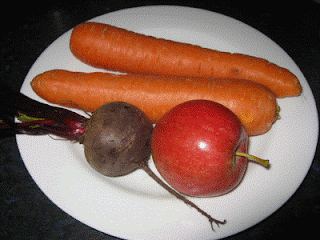Boost your body’s immune system
Super foods help combat an assortment of ailments
One of the best prescriptions for good health is also one of the easiest to follow: watch what you eat. Every day, new studies prove that eating the right foods regularly can help reduce the risk of cancer and heart disease, banish the blues and increase energy and vitality. Here are 10 nutrient-packed “super foods” that should top everyone’s grocery list.
1. Broccoli
This is one mean green! Broccoli is chock-full of the phytochemical sulforaphane, which makes headlines because of its potent anti-cancer properties. It’s also a rich source of beta-carotene (good for the eyes and immune system, among other things), fibre and vitamin C.
Toronto registered dietitian and author Liz Pearson was so convinced of the health benefits of this “King of Cruciferous Vegetables” that she called her first book When in Doubt, Eat Broccoli! But Leave Some Room for Chocolate (Penguin Books, 1998). For fast, easy and delicious ways to add vegetables — including broccoli — to your diet, visit 5 to 10 a day.
2. Blueberries
If you haven’t gone blueberry picking since you were a kid, here’s a reason to start again. In a peer-reviewed study of 100 common fruits, vegetables and nuts in the Journal of Agricultural and Food Chemistry, these blue jewels had one of the highest antioxidant capacities (the ability to combat cell-damaging free radicals that can lead to heart disease and cancer). And, like cranberries, blueberries appear to fight off urinary-tract infections by preventing E. coli bacteria from sticking to cells in the urinary tract.
John Stanton, president of the Running Room Canada, says he always starts his day with a big bowl of fresh fruit, including blueberries when they’re in season. “It’s light, it’s healthy, and then I’m ready to run.” For more on the power of blue, including tasty recipes for everything from wild blueberry chicken breasts to blueberry sorbet, check out Wild Blueberries.
3. Flax
“Ground flaxseed is the one thing I make sure I eat every day,” says Mairlyn Smith, co-author of The Ultimate Healthy Eating Plan That Still Leaves Room for Chocolate (Whitecap Books, 2002). Smith says flax is a great source of both soluble and insoluble fibre (which makes it a natural laxative) as well as plant lignans which may reduce the risk of developing hormone-sensitive cancers, such as prostate and breast cancer.
Flaxseed is also high in Omega-3 fatty acids, which are known to protect against heart disease. Smith eats a flaxseed muffin or sprinkles a tablespoon of ground flaxseed on her cereal every day. For more information on the health benefits of flax, including delicious ways to cook with it, visit the Flax Council of Canada.
4. Garlic
Since ancient times, physicians have used the “stinking rose” to treat health conditions including heart disease. Garlic contains allicin, a phytochemical that may lower cholesterol and make blood platelets less sticky, cutting the risk of clots.
In Mississauga, Ont., naturopath Rana Singh swears by the immune-boosting, cold-fighting power of the humble garlic bulb. He recommends chopping or crushing two or three cloves of fresh, raw garlic and adding them to whatever you’re eating.
For information on the health benefits of garlic and great ways to cook with it, visit The Garlic Information Centre and Garlic Sleuth. (Note: Consult your doctor before including more garlic than is customary in your diet.)
5. Green tea
Green tea is loaded with powerful antioxidants, which may protect against cell damage that leads to aging and help prevent heart disease and cancer. Green tea contains a polyphenol known as epigallocatechin gallate (EGCg), which in animal tests has been shown to prevent the formation of tumors. Researchers at Purdue University found in laboratory tests that EGCg killed human breast cancer cells but did not kill non-cancerous human breast cells.
Paulette Bourgeois, author of the Franklin the Turtle series of kids’ books, drinks green tea several times a day. “It’s not only healthy, it’s soothing,” she says. For more information on the health benefits of tea, visit the Tea Association of Canada.
6. Skim milk
“The one food I consciously remind myself to consume and monitor regularly is milk, since I know that I may not drink enough of it in the course of my regular routine to keep my bones strong,” says food writer and cookbook author Dana McCauley.
She’s not alone. Most women don’t get enough calcium, and one in four white women (the rate is lower in black and Hispanic women) will develop osteoporosis. Studies have found that increasing your calcium intake can also help relieve the symptoms of PMS.
To meet your daily quota, reach for three servings of milk or milk products. After a tough workout, make it low-fat chocolate milk, advises McGill University fitness coordinator Jill Barker. “It has the requisite amount of carbs and protein needed to promote optimal recovery in the working muscles.”
Visit the Dairy Farmers of Canada for more tips on adding calcium to your diet.
7. Salmon
Fresh or canned salmon is one of the best sources of the celebrated Omega-3 fatty acids, which can help prevent heart attacks. Studies have also shown that Omega-3 may have the ability to offset depression as well as protect against inflammatory diseases such as arthritis.
“I try to eat salmon twice a week, as do my kids,” says nutritionist Rosie Schwartz, author of The Enlightened Eater’s Whole Foods Guide.
8. Soy
Protein is one of the nutrients that most women don’t get enough of. They should have a protein-rich food every three to four hours during the day to keep energized, says dietitian Linda Barton.“Soy is perfect since it’s a plant-based protein that’s low in saturated fat.”
Soybeans and soy protein products — including tofu, miso, tempeh and soy drinks — also contain phytoestrogens that may slow the growth of some cancers, lower cholesterol and offer some protection against osteoporosis. Visit the Soyfoods Association of North America for more information and recipes.
9. Spinach
When asked to name one of her favourite super foods, Toronto registered dietician Leslie Beck praised spinach. It’s loaded with energy-promoting iron and folate, a B vitamin that prevents neural-tube defects in the fetus. It is important in red blood cell formation, protein metabolism, growth and cell division. The leafy green is also one of the best sources of lutein, an antioxidant that benefits eye, skin and cardiovascular health. For more information on the health benefits of spinach, visit Wholehealthmd.com.
10. Tomatoes
Research has found that tomatoes, especially cooked or processed ones, can lower the risk of some cancers and heart disease. Experts attribute this to lycopene, a potent antioxidant and the pigment that makes tomatoes red. A Harvard University study found that men who regularly ate tomato-based foods had lower rates of prostate cancer.
“We love tomatoes,” says Diane Clement, who founded the popular Tomato Fresh Food Cafe in Vancouver. She and her husband, Dr. Doug Clement, start their evening meal with their favourite tomato and bocconcini cheese salad. “The juicy tomatoes, loaded with lycopenes galore, are the perfect healthy jumpstart for any body,” she says. For more nutrition facts and recipes, visit California Tomatoes.






























